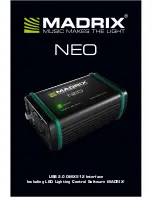
27
13. Troubleshooting
WARNING:
Risk of Shock. Troubleshooting procedures involve working with high voltages which can cause injury or death.
Troubleshooting should only be performed by trained personnel.
This section is a guide for troubleshooting equipment problems.
Table 9. Troubleshooting Procedures
Problem
Cause
Solution
Unit does not operate or
Power Failure Indicator is on
Power supply
Check that the cord is securely plugged in.
Plug another appliance into the outlet to see if it is live.
Check that the double pole circuit breaker located next to
the power inlet is in “ON” position (i.e“
I
” position). Try cycling
the switch to OFF position (i.e“O” position) and then bring to
ON position (“
I
”).
Test the voltage and verify that it is correct for your unit
(refer to
Table 2
).
If the outlet is dead, check the circuit breaker or fuses.
The unit should not be connected to a GFCI (Ground Fault
Circuit Interrupter) protected outlet as it may be subject to
nuisance tripping.
Temperature fluctuates
Temperature
Control
Make sure that the control is set correctly. Refer to
Section 9.3
.
Condenser
clogged
Make sure the condenser and filter are clean.
Refer to
Section 12.2
and
Section 12.3
.
Solution bottle
Make sure the solution bottles for the temperature sensors
are full. The solution is a 50/50 mixture of glycerine and
distilled water.
Other causes
If the temperature control is set correctly, the condenser
is clean, but temperature continues to fluctuate, call an
authorized service representative.
Low battery icon is lit
12V backup
battery needs to
be replaced.
Replace the battery. It is located on the top right hand side
of the cabinet. Call an authorized service representative.






































